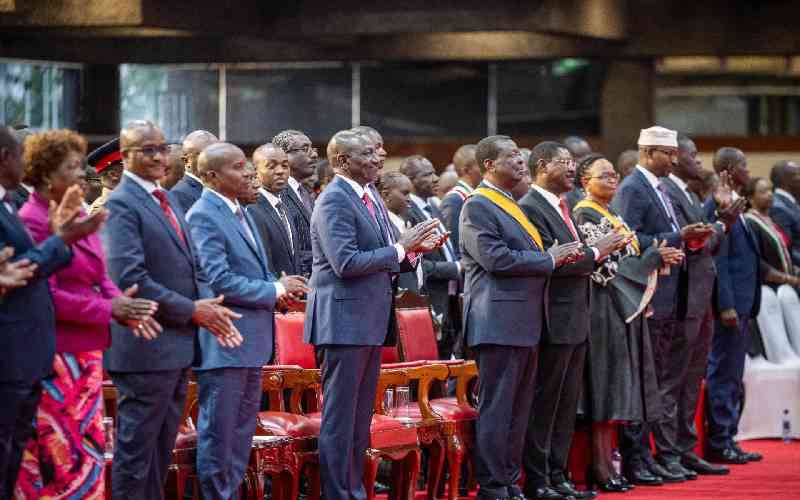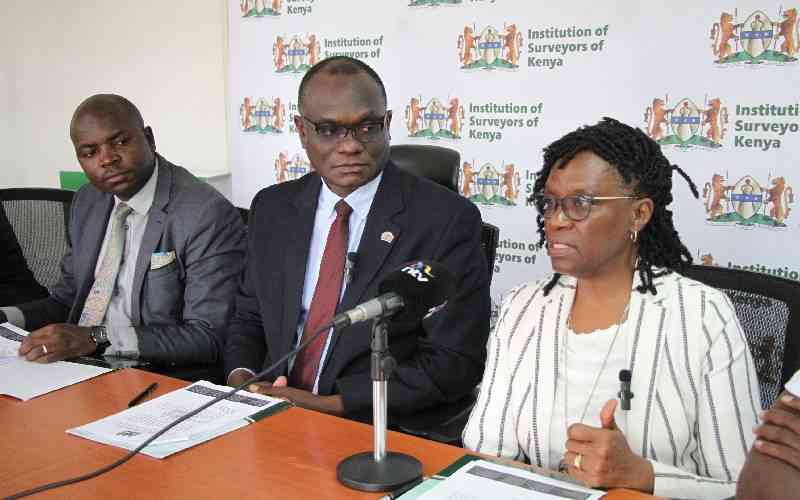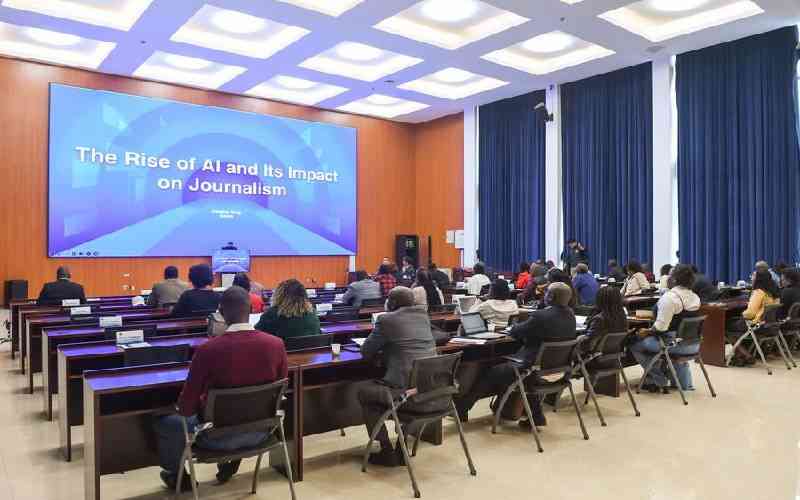
President William Ruto during the inauguration of August 27 as Katiba Day at the KICC.[PSCU]
Kenya is marking the 15th anniversary since promulgation of the 2010 Constitution, with President William Ruto having proclaimed August 27th the ‘Katiba Day’.
A presidential proclamation on Monday stated that August 27 marks 15th anniversary of the supreme law, presenting a unique opportunity to celebrate the Constitution, universally acclaimed as one of the most progressive.
“…by the authority vested in me by the Constitution, I do hereby proclaim that August 27 and every 27th day in the month of August forever thereafter shall be observed as Katiba Day in commemoration of the promulgation of Constitution of Kenya 2010,” the President said.
He said it will also be observed in Kenya’s diplomatic missions abroad as a day dedicated to renewing shared commitment to ideals of the Constitution by fostering national dialogue on constitutionalism, governance and the rule of law.
“While Katiba Day shall remain a working day, all government institutions in the three arms of Government and the two levels of governance, including schools, shall organise, hold and participate in solemn activities on that day to foster constitutional awareness and civic engagement,” the President said.
But even with the progressive nature of the Constitution, there is still unfinished business, especially with the not more than two-thirds gender principle. The journey to achieving this rule has been bumpy. In March last year, Ruto affirmed his commitment to realising the elusive two-thirds gender rule before conclusion of his term in office.
During the launch of the Women Governors Caucus G7 Strategy in Nairobi, President Ruto assured that the Kenya Kwanza administration was dedicated to achieving gender inclusivity as enshrined in the constitution.
“When I did a memorandum to Parliament, I did not do it for political correctness, it is because I had made a commitment to the women in Kenya Kwanza that we would finally do something about this two-third gender rule and it has been a back and forth for now over 10 years,” he said.
Again in November, Ruto urged Parliament to develop legislation to actualise the two-thirds gender rule and to take decisive steps toward implementing this constitutional requirement.
“This Parliament will recall that early in my tenure, I engaged the leadership of both Houses with recommendations on a working formula to actualise meaningful inclusion of women in national leadership. We must seriously take the next step in actualising the two-thirds gender rule,” Ruto stated.
A report on the status of implementation of the not more than two thirds gender principle in Ministries, Departments, Agencies and Counties (MDACs) for the Financial Year 2024/2025 was released in June.
According to the report, despite this robust legal framework, full realisation of the not more than two-thirds gender principle remains elusive.
The report by Ministry of Gender’s report states that progress has been marked by both significant milestones and persistent challenges, including inadequate budget allocations for gender mainstreaming, limited technical capacity, and entrenched sociocultural attitudes that hinder effective implementation.
Stay informed. Subscribe to our newsletter
Article 27(6) indicates that the State shall take legislative and other measures, including affirmative action programmes and policies designed to redress any disadvantage suffered by individuals or groups because of past discrimination.
“In addition to the measures contemplated in clause 27(6), the State shall take legislative and other measures to implement the principle that not more than two-thirds of the members of elective or appointive bodies shall be of the same gender,” Article 27(8) states.
The not more than two-thirds gender principle is one of the foundations of Kenya’s constitutional commitment to gender equality and inclusive governance. The principle mandates that no more than two-thirds of the members of any elective or appointive public body shall be of the same gender and compels the State to adopt legislative, policy, and affirmative action measures to address historical marginalization and promote balanced representation.
“This requirement is not merely aspirational, it is a constitutional imperative designed to ensure that the perspectives, experiences, and interests of both men and women are fully integrated into the formulation and implementation of laws and policies, thus fostering a governance structure that mirrors the diversity of Kenya’s population,” the report states.
Former Attorney General Justin Muturi says Article 27 says the State shall take legislative and other measures to ensure the not more than two thirds of members of elective or appointive bodies shall be of the same gender. “The State is not Parliament. That is one thing which people need to understand. I see people blaming Parliament… The State means all the arms of government,” he told The Standard yesterday.
At the electoral level, Muturi says as long as people have free will to choose without discrimination or being coerced, it is never a guarantee the not more than two thirds of either gender will be achieved, admitting that the provision poses a big challenge.
“I think it is the kind of thing that the entire country should be put in a referendum so that they can say, do we do top-up because that’s the only thing that can be done. The only way is like it is done in the county assemblies. You do a top-up,” he says.
But then, he explained that top-up would raise other issues of cost.
International Commission of Jurists – Kenya (ICJ-K), Programme consultant and advocate, Beatrice Monari says the Judiciary has tried to do its part in trying to push for the implementation of the rule, going from the advisory opinion rendered several years ago.
Again, she says former Chief Justice, David Maraga advised dissolution of Parliament in 2020 but it was not achieved, giving rise to an enforcement gap between constitutional design and political practice.
“The rule is not aspirational, it is substantive because it is anchored in the Constitution so appointive compliance needs to be immediate while elective compliance needs an implementing scheme and that is where the gap is,” Ms Monari said.
Despite the complexities around the rule may face, she said the push to achieve it continues, in addition to legislative goodwill.
“Things are moving every time, there is the handshake and so many things happening. Things have not been steady enough to make it stick. We should try to mirror Article 177(1) (b), which has been used successfully in county assemblies, may not be doable but maybe amend elections law to require alternating and a time bound ultimatum,” she says.
VOCAL Africa CEO Hussein Khalid says 15 years down the line, one of the major issues with the Constitution has been the gender rule and to a large extent, there were attempts to put in place measures to achieve it.
The progress, he says, has however been slow and despite the positions of Women Representatives trying to boost numbers in Parliament, they are only there to reach the limit but their presence is yet to be felt.
“Yes, we have more women, at least 47 from each county, but if you ask in terms of their influence in Parliament in terms of their contribution to laws and such, you find it is still very low. The idea behind the rule was not mainly to tick boxes but women issues to be felt within legislation and that has not been achieved,” he said.
He said there are still gender gaps in Executive, Judiciary, chairpersons position in parliamentary committees and other institutions, noting that the political goodwill is lacking to a large extent.
“If we are able to push for commitment, it should be possible to achieve it. Presently, it is just lip service where politicians keep mentioning the general rule to simply appease the public and to appear to be doing something. Gen Z have taught us that if we push enough, you can get what you desire as a people,” Khalid explained.
Coastal Association for People with Disabilities, Regional Coordinator, Hamisa Zaja said there have been many politics around it, given that a majority of other issues provided in the Constitution but the rule is moving in circles.
“Every President, in the beginning has shown goodwill, especially when we are around elections, it has been used as a tool to get women leaders and promises of implementing it and then disappears like that,” she said.
She said women have been shortchanged, terming it a betrayal of the rule of law and the women since their male counterparts have not shown goodwill.
“For women, we have nothing to celebrate because the gender rule was the only thing that would have shown, that men in Kenya have accepted women, that they can also take leadership but we have not got it, and it is two thirds of either gender,” she explained.







